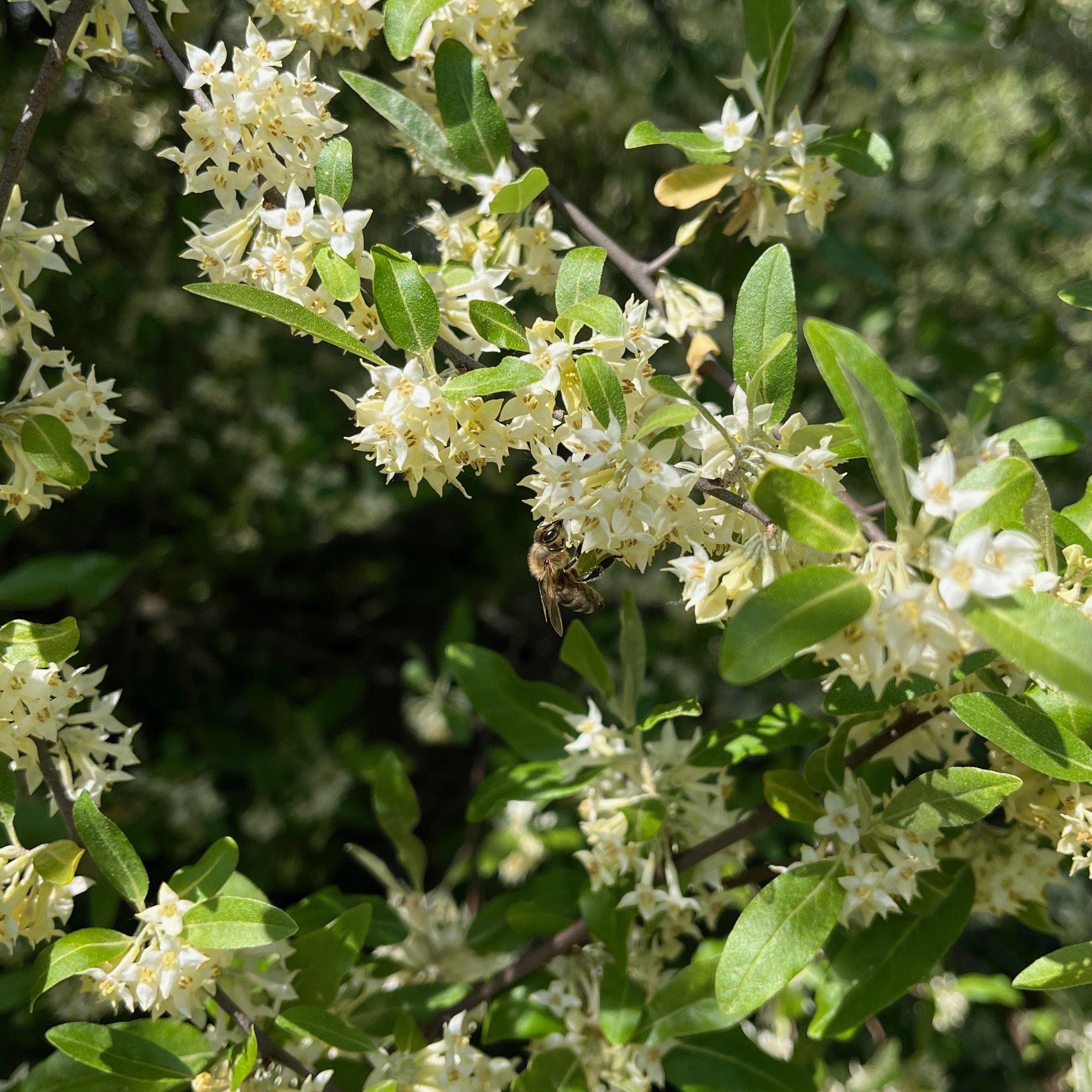Community is Key
Bees love Autumn Olive, but it’s pretty darn invasive!
In life, as in gardening, it’s easy to get discouraged. Some days, the magic is everywhere—you’re struggling to carry a heavy load and a stranger holds a door open with an encouraging smile. “You’ve got this!” the smile seems to say, but the gesture really means, “We’re all in this together, and today I’ve got your back!” A hillside orchard, seemingly barren the evening before, erupts in a riot of pink and white, with the promise of sweet summer fruit to come. The world sometimes feels filled to the brim with kindness, beauty and possibility.
…And sometimes, not so much. I had just spent an unpleasant hour on I-87, getting cut off by aggressive drivers and dodging sudden lane closures for pop-up construction. Exhausted and bitter, I looked forward to a good walk in the woods with my puppy, a ritual that we had missed for a few weeks due to my busy schedule and her recovery from surgery. On our last walk, I had found several stands of wild ramps, and the cattails were just starting to send up new shoots amidst last year’s browned out stems. This time, though, the ramps were drowning in a sea of mustard garlic. Japanese honeysuckle, blooming white and fragrant, was competing in the understory with Japanese barberry, thorny and rough. Autumn olive flared up in the sunny spots. At the pond, the native cattails seemed to be losing the battle against the invasive Phragmities australis. Oriental bittersweet had resumed the slow but inevitable choking of a stand of black cherries. I was hard pressed to find a native plant from eye-level down. In other words, I was looking at a horticultural garbage dump. No deer browsing here—they don’t mess with that junk. No wonder they’re destroying my neighbor’s hostas and cherry laurel instead.
I came back from that walk rather grumpy—the pleasure I usually take from time in nature with my puppy, her exuberance feeding my joy, was replaced by a sinking feeling. Dread, actually. I was in the fast lane—destination Ecological Catastrophe, with no one at the wheel.
With my daughter, after running 12.7 miles, and not feeling the burn at all!
But just a few days before, I had had an altogether different experience in the woods, a rather joyous one. I was running leg three of Mohonk Preserve’s Rock the Ridge 50-mile relay—12.7 miles, mostly uphill, and I was not in the best shape of my life. It could have been miserable, discouraging, even painful, but I had such a good time! I entertained myself during my journey through the hilly, wooded carriage trails by scoping out native species—wild Solomon’s seal, Mountain laurel, trout lily. I didn’t see any Japanese barberry or invasive honeysuckle that day, no Norway maples or garlic mustard. You wouldn’t have known from the look on my face that I was seven miles into a half marathon that I really had no business running. It felt so good to be out there, in nature, as part of a team, and for a good cause.
Was there really no Japanese barberry on my run, or Oriental bittersweet? Doubtful. I’m sure the good folks at the Mohonk Preserve do a better job managing their forest than I do our little woods, but it had to be there. Too much land, too few hands, to keep ahead of an aggressive mass of thorns and seed weeds. So what was different?
On the day of my walk in the woods with puppy, I had spent three hours in the car, in a swift river of commuters, each in our own 4,000-pound isolation chambers, each on our own mission, anonymous, no kindness or reciprocity to speak of. The future of humanity looks pretty bleak from the passing lane of I-87. On the day of the run, I was buoyed by the love and support of my team, my family, my friends… but also complete strangers! Folks on a walk through the preserve, cheering on us weary runners; other runners on the trail, offering up breathless support—”You’ve got this!”, “Looking good!”, “Almost there!” When breath was in too short supply, a smile or a thumbs up.
This feeling of community and support framed my whole experience in nature that morning—it deepened my sense of connection to the non-human living world all around me, and to the humans around me, too. I wasn’t necessarily blinded to the grim realities of our shared environment, I was just in a frame of mind that was more oriented to the solution, not the problem.
Being in nature—a beautiful garden, a trail run, a mountain vista—is not restorative because it allows us to escape from other humans. Rather, it’s a bridge to help us reconnect to our shared humanity, our shared habitat. Hopefully, it reminds us that we, as humans, are not separate from nature, but part of it. Should we, as humans, do a better job cleaning up our act and protecting our environment? Absolutely. But we can’t go it alone, and we’ll never do it just for ourselves. We have to do it for each other, and with each other. That may seem hopelessly optimistic, even saccharine. But doesn’t hope feel better than the opposite? And giving up is never going to get us to the finish line.


